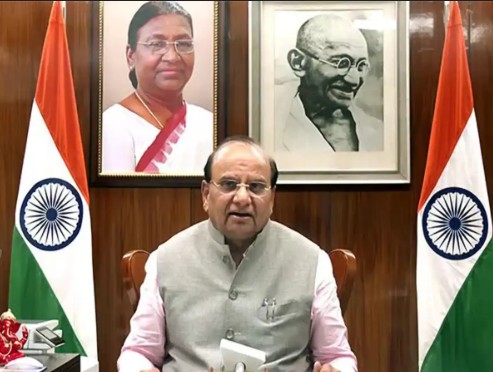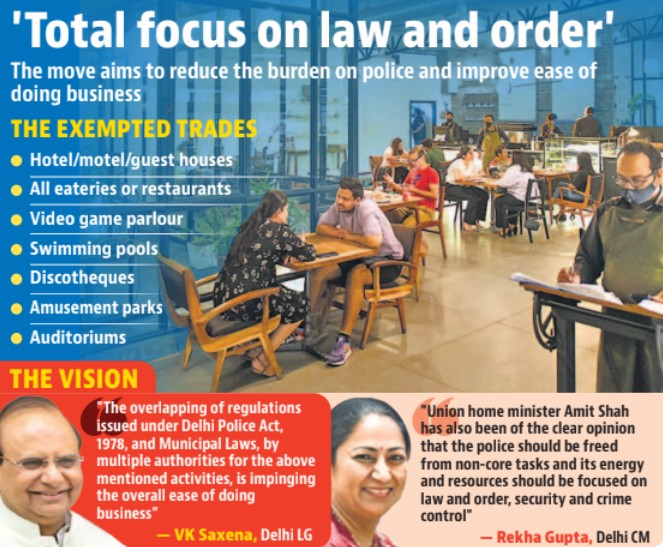Delhi Lightens Load on Businesses: Police Licensing Axed for Seven Key Trades
New Delhi, India – June 23, 2025 – In a landmark move set to significantly boost the ease of doing business in the national capital, Lieutenant Governor (LG) VK Saxena has issued a directive that exempts seven key trade activities from the mandatory police licensing clearance. This decision, formalized in an order dated June 19, 2025, aims to alleviate the burden on the Delhi Police and streamline regulatory processes for thousands of commercial establishments.
The seven trades that will no longer require a license from Delhi Police are: hotels/motels/guest houses, all eating houses or restaurants, swimming pools, discotheques, video game parlors, amusement parks, and auditoriums.
LG Saxena’s order explicitly withdraws the sanction granted to the Commissioner of Police, Delhi, for issuing regulations under Section 28 (1) of the Delhi Police Act, 1978, concerning these specific trade activities. The Commissioner of Police has been directed to issue a notification to officially repeal these regulations with immediate effect.

Relief for Businesses, Focus for Police:
This development has been met with widespread relief and commendation from trade confederations, industries, and stakeholders across Delhi. For years, businesses in these sectors faced the cumbersome process of obtaining multiple licenses and No-Objection Certificates (NOCs) from various authorities, including an additional layer from the Delhi Police.
Delhi Chief Minister Rekha Gupta lauded the move, stating, “Now the licensing process related to seven business sectors has been taken away from the police and handed over to the municipal bodies and related departments.” She emphasized that this aligns with Union Home Minister Amit Shah’s clear opinion that the police force should be freed from non-core tasks to allow its energy and resources to be focused on law and order, security, and crime control. “Freeing the police force from non-core tasks in a highly pressurised metropolis like Delhi is in line with his policy,” Gupta added, highlighting it as an “ideal example of Centre-state coordination and public welfare governance.”
An official with the licensing unit of Delhi Police also acknowledged the positive impact, noting, “There’s always shortage of staff in security, traffic, crime branch and other departments. This could help as some staff could be transferred there.” This redistribution of police resources is expected to enhance their efficiency in core policing duties, including crime control and women’s safety.
“Minimum Government, Maximum Governance” in Action:
LG Saxena underscored that this move embodies the principle of “minimum government and maximum governance” by eliminating redundant licensing regimes. The order references previous observations by the Delhi High Court and Supreme Court, which had emphasized that the Delhi Police should “focus on law and order” rather than the “responsibility of licensing,” and that the “existing system of police granting licences should be abolished.”
The decision was informed by the recommendations of a committee constituted under the chairmanship of the Additional Chief Secretary (Home), comprising officers from Delhi Police, and the law and IT departments of the Delhi government. This committee, after thorough deliberation, concluded that relieving the Delhi Police of these licensing responsibilities would address their staff shortage and allow them to prioritize core policing duties.
The LG’s order also highlighted the existing overlap of regulations. Civic bodies like the Municipal Corporation of Delhi (MCD), New Delhi Municipal Council (NDMC), and Delhi Cantonment Board already have their own regulations in place for these trade activities under their respective acts. The Delhi Police’s licensing was, therefore, an “additional layer” that impinged on the “overall ease of doing business.” The order cited examples of states like Gujarat, Karnataka, Maharashtra, and Goa, which have successfully implemented similar measures previously.
Industry Cheers, Calls for Further Reforms:
Sandeep Anand Goyle, from the Delhi chapter of the National Restaurant Association of India (NRAI), hailed the decision as “positive” and expressed optimism that it would attract more revenue to Delhi and increase investments in the Hotels, Clubs, and Restaurants (HCR) segment. He further urged the administration to establish a unified license portal where businesses can seamlessly obtain other necessary clearances such as Fire NOC, Health Trade License, and Delhi Pollution Control Committee (DPCC) consent orders.
Brijesh Goyal, who heads the Chamber of Trade and Industries (CTI), echoed the sentiment, stating that traders previously had to navigate multiple departmental licenses, making the police license an unnecessary burden. “There was no separate need for the licence of Delhi Police and the businessmen were not comfortable with the police licence. We had appealed to abolish the Delhi Police licence and welcome this move,” he said. The industry is now eagerly anticipating a positive new excise policy to further streamline business operations.
A Counterview: Concerns Over Authority:
However, not all reactions were unanimously positive. Vikram Singh, a former Director General of Police (DGP) for Uttar Pradesh, expressed a dissenting view, terming the order as a “retrograde step” that curtails the authority of the Delhi Police Commissioner. “There is more than what meets the eye. Making Delhi police a toothless tiger and denying them the authority under some protect or the other does not seem to be appropriate,” Singh remarked, raising concerns about potential impacts on oversight and public order.
Despite this cautionary note, the overwhelming consensus among government officials and industry stakeholders is that this landmark decision by LG VK Saxena marks a significant step towards creating a more business-friendly environment in Delhi, ultimately benefiting both commercial establishments and the efficiency of the police force.

